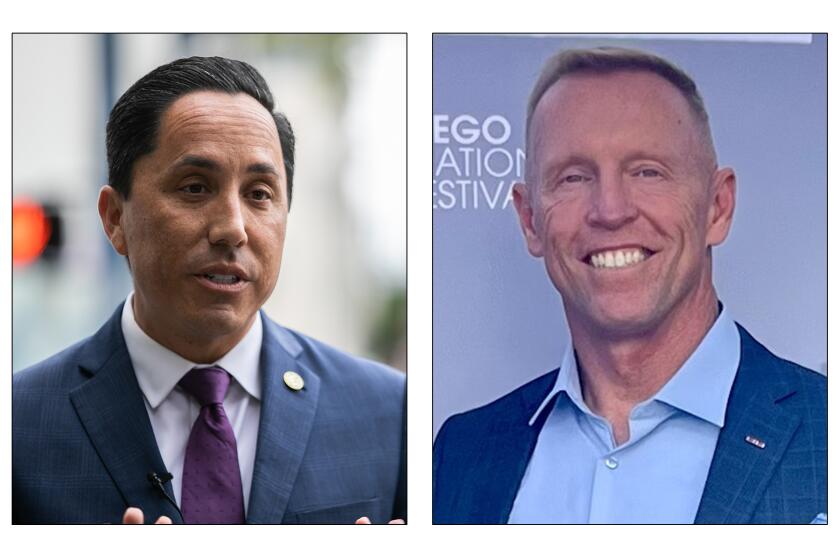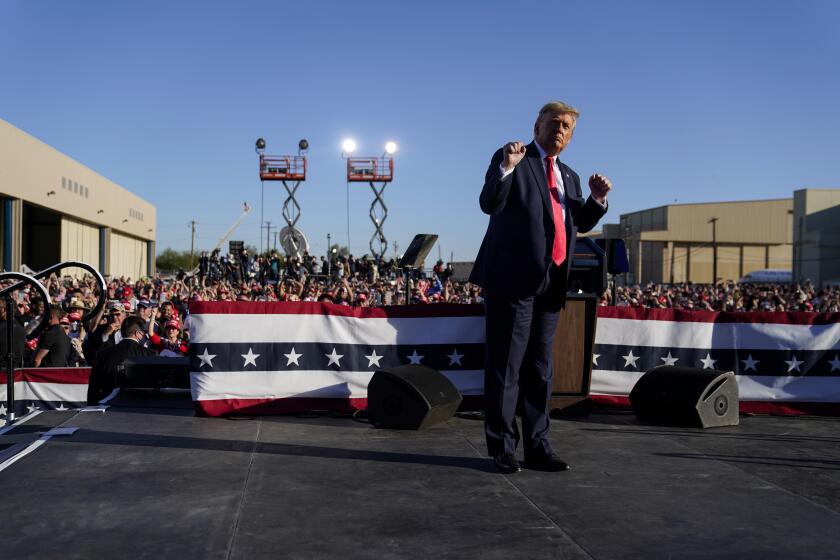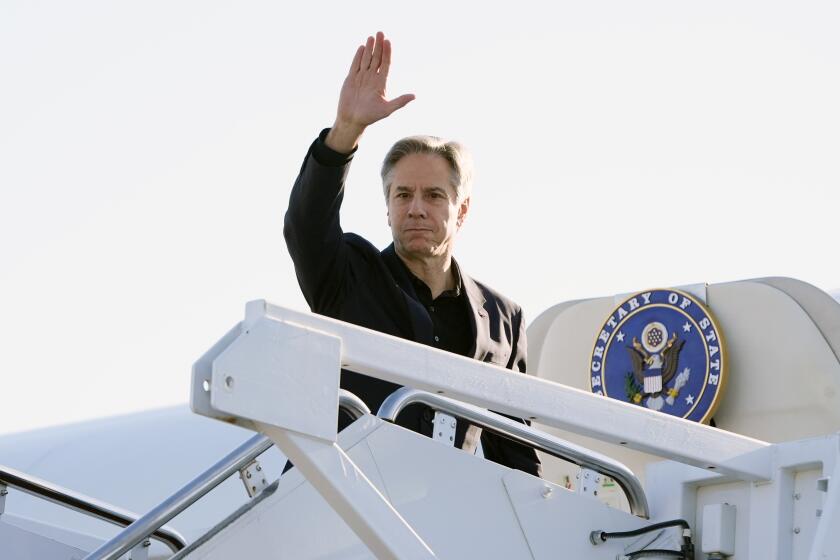After standing by Filner, labor moves on
Mayor Bob Filner swept into office last December thanks to huge financial support from labor organizations and union leaders kept him afloat politically in recent weeks by counseling him behind closed doors as he tried unsuccessfully to survive a sexual harassment scandal.
Now labor plans to play a large role in determining Filner’s successor, a fact that is inevitable given labor’s political clout but also upsetting to those who blame unions for getting Filner elected in the first place.
There’s no doubt many potential candidates, especially those on the Democratic side, will openly court support from various labor organizations ahead of the coming special election to replace Filner. Whether those endorsements carry the same weight in a post-Filner era remains to be seen, but it doesn’t appear labor leaders are lacking in confidence.
Mayor Filner driven from office” Complete coverage
Frank De Clercq, head of the city firefighters union, interjected into a Twitter discussion on Sunday about whether the Republicans would back former City Councilman Carl DeMaio or current Councilman Kevin Faulconer in the coming race.
“One or both would be welcome for a shellacking,” De Clercq wrote.
One of the biggest criticisms leveled at unions during the past six weeks was their near-universal silence about the sexual misconduct allegations against Filner. They were quiet largely because of how much they invested in terms of time and money to get Filner elected and the potential for their issues to be advanced by the first Democratic mayor in 20 years. For example, labor-funded political action committees spent more than $3.8 million in last year’s mayoral contest to help Filner, who struggled throughout the campaign to raise money on his own.
The influential San Diego-Imperial Counties Labor Council aided him the most and refused to call on Filner to resign even as more and more women came forward accusing Filner of inappropriate sexual behavior and unwanted advances, such as kisses, groping and derogatory comments.
Richard Barrera, who heads the council, said the organization remained silent for two reasons. First, due process is a top priority among unions and taken seriously. Second, if the labor council had called for his resignation the lines of communication with Filner likely would have been severed.
“What we tried to do is try to have communication …helping him think through what’s in the best interests of the city,” Barrera said.
Barrera noted Filner’s decision to undergo two weeks of intensive therapy to address his behavior came at the behest of labor. He said conversations about whether Filner should resign were avoided as the primary focus was getting Filner to understand the depth of his predicament and how it was affecting San Diego.
Tony Krvaric, chairman of the local Republican Party, has been one of labor’s harshest critics and a longtime political opponent. He blamed unions for looking the other way for “crass political, ideological reasons” to support Filner and said they will rue the day he was elected.
“Their influence has been damaged,” Krvaric said. “People will be more aware of who’s pushing whom in future elections.”
Barrera said he doesn’t think labor will lose any influence because it stood by Filner. He said there’s been a political shift in the city and those who voted for Filner still overwhelmingly support the vision he shared with labor.
“Bob Filner has come and gone, but those people remain out there ready to vote,” Barrera said. “ …Any candidate that we get behind is a candidate that can advance issues for working families.”
However, in the June primary that sent Filner to the fall runoff, San Diegans overwhelmingly voted for a pension overhaul adamantly opposed by labor.
Tom Lemmon, head of the San Diego County Building and Construction Trades Council, said blame shouldn’t placed at the feet of labor because there are plenty of politicians on both sides of the political aisle who have been struck down by scandal.
“My sense is we’re going to continue doing everything we can to get progressive people elected to office,” he said.
Not everyone from labor circles continued to support Filner through the crisis. Former labor leader Lorena Gonzalez, now a state assemblywoman, was one of the first elected officials to call for his resignation. Her stance carried tremendous weight because, as head of the labor council, she was given much of the credit for Filner’s mayoral victory.
Filner didn’t forget his labor friends when he announced his resignation Friday. He dedicated a full minute of his 10-minute speech to thanking them.
“I have to particularly thank the leaders of our working community, the labor community, for helping me not only in the first seven months but the last few weeks,” he said. “I needed the time and the support to reflect on what matters to me personally as well as the confidence to know that the city will move forward and labor leaders helped me on both fronts. They encouraged me to seek professional help, which I did and I’m continuing.”
With Filner’s mayoral tenure set to end at 5 p.m. this Friday, there is no shortage of potential candidates and a key factor in the special election will be which one can collect most or all of the labor community’s support.
[See:
Those who would be mayor, maybe]
That labor candidate won’t be Assembly Majority Leader Toni Atkins, who announced Sunday she wouldn’t be running for mayor. In a statement, Atkins, a former city councilwoman who served as acting mayor after Mayor Dick Murphy resigned in 2005, said many people reached out to her during the past few weeks encouraging her to run.
“Now that Mayor Filner has resigned, I wanted to share with you my decision — reached after much careful consideration — that I will not be a candidate for mayor,” Atkins said. “I am deeply committed to helping the city heal and move forward. But I also take very seriously my responsibility to the people who elected me to represent the 78th Assembly District in Sacramento and to my colleagues in the Assembly, whom I have the privilege of serving as majority leader.
A weekend poll conducted for the U-T San Diego and 10News shows it could be a wide open mayoral contest with none of the potential candidates receiving more than 20 percent. The poll by SurveyUSA asked 513 likely voters to choose from among 10 politicians on Sunday.
DeMaio topped the poll with 18 percent, followed by former Assemblyman Nathan Fletcher at 16 percent and former Councilwoman Donna Frye at 14 percent.
The numbers weren’t encouraging for the other candidates mulling a mayoral bid. Councilwoman Marti Emerald had 10 percent, Council President Todd Gloria received 9 percent and City Attorney Jan Goldsmith and Faulconer each had 6 percent. None of the others — Atkins, former state Sen. Christine Kehoe and county Supervisor Ron Roberts — topped 5 percent.
Frye, who has won praise for coming forward last month with two others on behalf of women allegedly harassed by Filner, and Goldsmith, who helped negotiate Filner’s resignation, have each said they don’t plan to run.
So far, the only declared candidate is Fletcher. None of the candidates can afford to wait long as the special election — which the City Council will schedule in a Wednesday vote — must be held within 90 days.
Mayor Filner driven from office” Complete coverage
Get Essential San Diego, weekday mornings
Get top headlines from the Union-Tribune in your inbox weekday mornings, including top news, local, sports, business, entertainment and opinion.
You may occasionally receive promotional content from the San Diego Union-Tribune.





